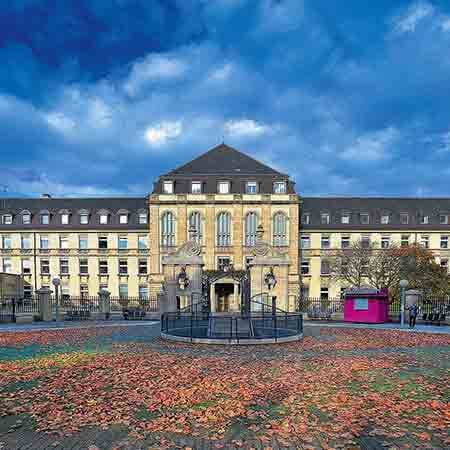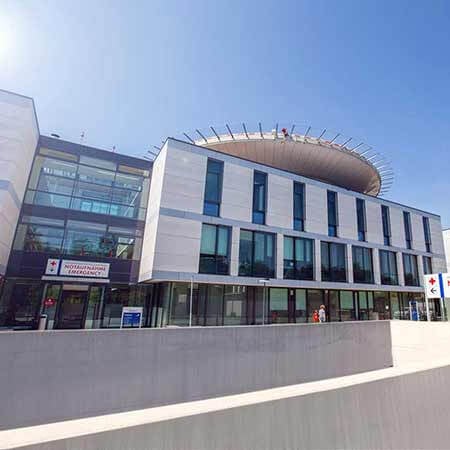Acute lymphoblastic leukemia is a type of blood cancer that develops from immature white blood cells. This is a severe disease that, in its natural course, leads to death in a few months. Nonetheless, doctors in developed countries usually successfully deal with the treatment of acute lymphoblastic leukemia. Even in the case of the development of the most aggressive forms, the therapy helps to cure the disease completely.
Content
- Chemotherapy
- Targeted therapy and immunotherapy
- Radiation therapy
- Recurrence treatment
- Stem cell transplant
- CAR T-cell therapy
- Where to undergo treatment?
Acute lymphoblastic leukemia is a cancer that affects white blood cells (lymphocytes).
Stages of leukemia are early pre-B ALL, common ALL, pre-B(T) ALL, and mature B(T)-cell ALL.
Treatment includes chemo- and immunotherapy, irradiation, CAR T-cell therapy, and stem cell transplantation.
Cost of treatment with chemotherapy – from €43,781. Price for bone marrow transplantation – from €97,374. Cost of CAR T-cell therapy – from €81,970.
Best hospitals in Europe are:
- University Hospital of Ludwig Maximilian University of Munich
- University Hospital Rechts der Isar Munich
- University Hospital Frankfurt am Main
- Helios Hospital Berlin-Buch
- Clinic of Advanced Biological Medicine Frankfurt am Main
Chemotherapy
While surgery is considered the primary treatment for most cancers, acute lymphoblastic leukemia can be cured with chemotherapy. The participation of surgeons is usually not required, except in cases of emergency, when a tumor mass is so large that it compresses the vital organs.
Blood cancer treatment is carried out in three stages:
Induction is aggressive chemotherapy that aims to achieve cancer remission. Remission means that leukemia cells are absent in bone marrow samples. Remission does not yet mean a cure, since a small number of leukemia cells still remain in a patient's body. It is for this reason that treatment continues after induction. The starting stage of chemotherapy for acute lymphoblastic leukemia lasts about 1 month, while the total duration of treatment for blood cancer reaches 2-3 years.
Conventional cancer chemotherapy regimens are effective in more than 90% of patients. The younger the age, the better the results. Remission of acute lymphoblastic leukemia in children can be achieved in more than 95% of cases.
Since a chemotherapy regimen during this period is quite intense and may cause side effects, patients at this stage of treatment for acute lymphoblastic leukemia stay at the hospital all the time. Chemotherapy blocks the division of not only cancer cells, but also other cells that are rapidly dividing. The function of the bone marrow is almost always affected. As a result, the production of blood cells decreases. To overcome side effects, patients frequently require antibiotics, as well as red blood cell and platelet transfusions.
The most common treatment regimen involves chemotherapy with three drugs. In high-risk patients, four drugs can be used at once. In Philadelphia-positive acute lymphoblastic leukemia, targeted therapy can be additionally prescribed.
At the stage of induction, patients receive not only systemic, but also intrathecal chemotherapy. This involves injecting drugs into the cerebrospinal fluid. This necessity is due to the fact that blood cancer often spreads to the central nervous system. However, most drugs cannot cross the blood-brain barrier, so leukemic cells remain in the brain. Doctors perform a lumbar puncture to destroy them. The procedure involves the injection of drugs into the spinal canal, just below the point where the spinal cord ends. In total, 2 injections are required in the first month, and then several more injections 1 time in the next 2 months. In high-risk acute lymphoblastic leukemia, drugs can be injected into the cerebrospinal fluid even more often.
Consolidation begins after achieving remission and lasts for several months. This phase of treatment for acute leukemia destroys any remaining cancer cells in the body. Doctors use combinations of several drugs to avoid the formation of resistance in cells to chemotherapy agents. Intrathecal chemotherapy is still going on, although injections are becoming rarer.
As a rule, during the consolidation phase, treatment is not as intense as during induction. However, some patients still have leukemic cells. In this case, minor residual disease is diagnosed. These patients require more aggressive drug treatment for cancer. Doctors can also repeat the course of induction chemotherapy, which is called "delayed intensification".
Maintenance therapy lasts about 2 years. The task of this stage of treatment is to prevent the recurrence of the disease and destroy the remaining cancer cells to cure acute lymphoblastic leukemia completely. Patients take several drugs. Some of them are taken constantly, and others in short courses.
Targeted therapy and immunotherapy
Other drugs that are effective in the treatment of some forms of acute lymphoblastic leukemia are as follows:
BCR-ABL inhibitors can be used in the presence of the Philadelphia chromosome in cancer cells. This is more common in myelogenous leukemia but can also be found in some patients with lymphoblastic leukemia. BCR-ABL inhibitors are combined with chemotherapy.
CD19/CD3 monoclonal antibodies can be used for B-cell lymphoblastic leukemia. The drug is used after chemotherapy. The course of treatment is 4 weeks, and a patient spends all this time at the hospital, so the infusions are carried out continuously. In addition, immunotherapy with monoclonal antibodies may cause complications, and, in this case, a person should be provided with timely medical care. The course of treatment with antibodies can sometimes be repeated after 2 weeks.
Radiation therapy
Radiation therapy is highly effective for acute lymphoblastic leukemia, but not all patients require this treatment option. As a rule, cancer can only be cured with chemotherapy. Irradiation can be required in the following cases:
- a large number of leukemia cells were detected in the cerebrospinal fluid;
- preparation for a bone marrow transplant.
In recent years, more and more new drugs have appeared, and drug therapy regimens for blood cancer have improved, so even in these two cases, radiation therapy is used less and less frequently. This is due to the fact that most patients with acute lymphoblastic leukemia are children, and irradiation of the brain and spinal cord may cause a developmental delay with impaired cognitive functions. For this reason, even in high-risk acute lymphoblastic leukemia, doctors are more likely to prefer more intensive chemotherapy, but try to avoid radiation therapy.
Recurrence treatment
If cancer has recurred after treatment, the further treatment tactics depend on how aggressive acute lymphoblastic leukemia was, what the previous treatment was, how successful it was, and how much time has passed from remission to recurrence.
As a rule, doctors prescribe chemotherapy to treat cancer recurrence. If the time before the onset of recurrence of acute lymphoblastic leukemia turns out to be significant, it is possible to use the same regimen as for the first time, or one that is similar to it. A short remission requires the use of other drugs, and the treatment regimen becomes more aggressive. Even in cancer recurrence, acute lymphoblastic leukemia can still be cured in many patients.
Recurrence can be extramedullary. This is when cancer recurs outside of the bone marrow. Most often, this is a recurrence from the central nervous system, and, in boys, a tumor may recur in the testicles. This form of the disease can be treated with chemotherapy in combination with radiation therapy.
Stem cell transplant
A bone marrow transplant is the most effective treatment for acute lymphoblastic leukemia. This can be resorted to in the most severe cases, when it is not possible to cure cancer with another method.
A stem cell transplant can be:
- autologous – transplantation of a patient's own cells;
- allogeneic – transplantation of donor cells.
An allogeneic transplant is mostly used for acute lymphoblastic leukemia. Before it is carried out, doctors destroy all cancer cells in the body with high-dose chemotherapy, sometimes combined with irradiation. A successful transplant results in the activation of the graft-versus-tumor immune response. Immune cells are formed and they completely cure acute lymphoblastic leukemia.
Indications for a stem cell transplant include:
- a high risk of cancer recurrence;
- unsuccessful attempts to achieve remission at the stage of induction;
- cancer recurrence, especially up to 6 months after successful chemotherapy;
- Philadelphia chromosome-positive acute leukemia.
In acute myeloblastic leukemia, the need for a stem cell transplant is less common than in lymphoblastic leukemia because this type of cancer is less likely to recur after its initial treatment, and the response rate to chemotherapy is higher.
CAR T-cell therapy
CAR T-cell therapy is used to treat leukemia that has recurred and is not responding to any other treatment.
Doctors take immune cells from a patient's body. Their genotype is then changed. Once modified, leukocytes are able to attack cells containing CD19 receptors. Therefore, they destroy the tumor, but do not damage healthy tissue. The modified cells are cultured to increase their numbers and then injected into the body after several days of chemotherapy. The whole process, from obtaining cells to their injection, takes several weeks.
Although CAR T-cell therapy is expensive and sometimes causes complications, this treatment for acute lymphoblastic leukemia is very effective. Even the most aggressive and advanced forms of cancer can be cured with its help. The most dangerous complication is cytokine release syndrome. This is a very severe inflammation that leads to fever, nausea, muscle and joint pain, as well as breathing difficulties. Doctors are usually able to manage these symptoms, but additional medical procedures and drugs are required for the treatment of complications.
Where to undergo treatment?
You can undergo your treatment of acute lymphoblastic leukemia abroad, in one of the best Cancer Centers in the world. In this case, you will get the best results with a minimal risk of complications. Developed countries offer the most modern drugs and techniques to cope with even severe cases of the disease.
There are a few reasons for you to undergo your treatment abroad:
- modern chemotherapy regimens curing leukemia in most patients;
- innovative drugs for targeted therapy and immunotherapy, including BCR-ABL inhibitors and monoclonal antibodies;
- the use of the latest types of radiation therapy that destroy leukemic cells and almost do not damage healthy tissues;
- even severe cases of leukemia can be successfully treated: in high-risk patients, in a high concentration of leukemic cells in the central nervous system, in recurrences, including extramedullary ones;
- doctors abroad use innovative procedures, including a stem cell transplant and CAR T-cell therapy.
You can make your treatment appointment through the Booking Health service. Our website presents the best clinics, and shows the cost of treatment in each of the Oncohematological Centers. You can make your treatment appointment at the selected clinic through the Booking Health service. In this case, the cost of treatment for you will be lower due to the lack of additional taxes for foreign patients. The specialists of the Booking Health company will advise you on all issues and organize your trip abroad.
Authors:
This article was edited by medical experts, board-certified doctors Dr. Nadezhda Ivanisova, and Dr. Bohdan Mykhalniuk. For the treatment of the conditions referred to in the article, you must consult a doctor; the information in the article is not intended for self-medication!
Our editorial policy, which details our commitment to accuracy and transparency, is available here. Click this link to review our policies.
Sources:
National Center for Biotechnology
American Cancer Society
Cancer Support Community










